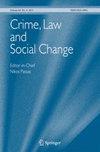Organizational life-cycle analysis of corporate offending: insights into how changes in business cycles interact with regulatory oversight to shape compliance and violations
IF 1
4区 社会学
Q3 CRIMINOLOGY & PENOLOGY
引用次数: 0
Abstract
Abstract This paper showcases an organizational life-cycle analysis of corporate offending behavior in small businesses. It analyzes two small food and hospitality firms in China, drawing on deep ethnographic data collected during three years of fieldwork. The paper investigates these two businesses as they go through three phases: pre-existence, existence, and survival. The study shows that organizational life-course analysis is important for understanding the development and root causes of organizational offending. It finds that offending evolves alongside the development of the organization. It shows that an organizational life-cycle analysis should focus not just on changes in the corporation itself, but also on how the regulatory context changes over the course of the organization’s development and maturing. Stages in the business cycle coincide with changes in regulatory encounters, and this shapes how corporations view what regulators expect of them and the extent to which they can violate such expectations. This points to a broader form of life-course analysis. It urges the field to moves beyond an analysis of changes in the business to also study the how such changes coincide with changes in the regulatory frameworks that are supposed to monitor and reduce offending.企业违规行为的组织生命周期分析:洞察商业周期的变化如何与监管监督相互作用,从而形成合规和违规行为
摘要本文对小企业企业违规行为进行了组织生命周期分析。它分析了中国的两家小型食品和酒店公司,利用在三年的实地调查中收集的深入的民族志数据。本文调查了这两种业务,因为他们经历了三个阶段:前存在,存在和生存。研究表明,组织生命历程分析对于理解组织犯罪的发展及其根源具有重要意义。研究发现,违规行为会随着组织的发展而演变。它表明,组织生命周期分析不仅应该关注公司本身的变化,还应该关注在组织发展和成熟的过程中,监管环境是如何变化的。商业周期的各个阶段与监管遭遇的变化相吻合,这决定了企业如何看待监管机构对它们的期望,以及它们能在多大程度上违反这些期望。这指向了一种更广泛的生命历程分析形式。它敦促该领域超越对业务变化的分析,还要研究这些变化如何与监管框架的变化相吻合,而监管框架本应监控和减少违规行为。
本文章由计算机程序翻译,如有差异,请以英文原文为准。
求助全文
约1分钟内获得全文
求助全文
来源期刊

Crime Law and Social Change
Multiple-
CiteScore
2.50
自引率
0.00%
发文量
53
期刊介绍:
Covers crime and deviance at the global, national, regional and local level, worldwideHas a special focus on financial crime, corruption, terrorism and organizational crimeWelcomes criminological research in the areas of human rights, comparative and international criminal law and criminal justice Crime, Law and Social Change publishes peer reviewed, original research articles addressing crime and the political economy of crime, whether at the global, national, regional or local levels, anywhere in the world. The Journal often presents work on financial crime, corruption, organized criminal groups, criminal enterprises and illegal markets, state crime, terrorism and security issues, cybercrime, cross-border crime and environmental crime. In addition, Crime, Law and Social Change welcomes criminological research in the areas of human rights, comparative and international criminal justice, compensation and justice for serious crime victims, international criminal law and cooperation. Finally, the Journal publishes multi-disciplinary criminological research focusing on gender, age, racial and ethnic equality issues.
 求助内容:
求助内容: 应助结果提醒方式:
应助结果提醒方式:


